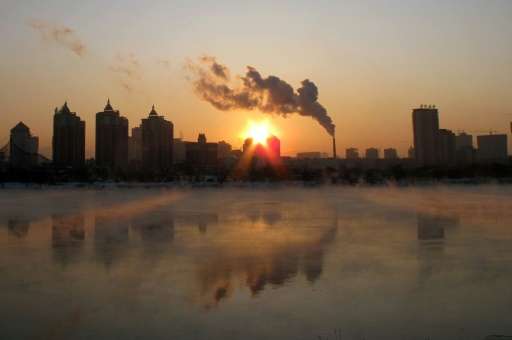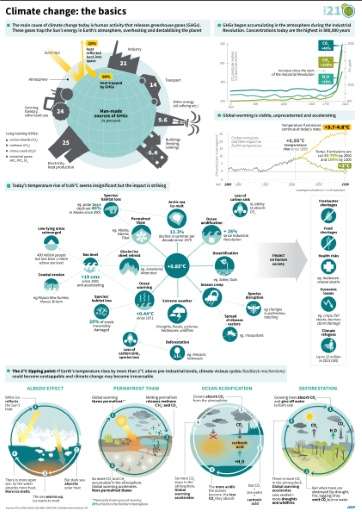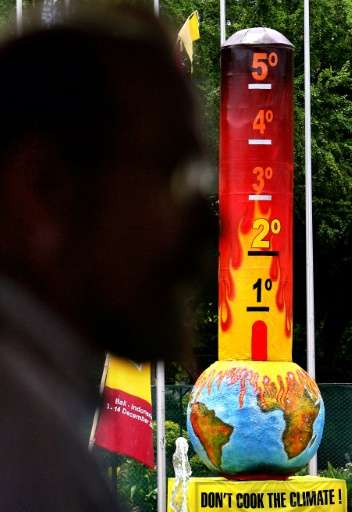Climate 'carbon budget' soon maxed out: study

The window of opportunity for humanity to cap global warming by slashing greenhouse gases is closing faster than previously thought, according to a study released Tuesday.
Earlier estimates of our "carbon budget"—the amount of heat-trapping carbon dioxide we can still put into the atmosphere without warming Earth by more than two degrees Celsius (3.6 degrees Fahrenheit)—have ranged from 590 billion to 2.4 trillion tonnes.
The new research says the upper limit is actually half that, some 1.24 trillion tonnes of CO2.
"We have figured out that this budget is at the low end of what studies indicated before," said lead author Joeri Rogelj, a climate scientist at the International Institute for Applied Systems Analysis in Austria.
"If we don't start reducing our emissions immediately, we will blow it in a few decades."
The goal of holding the rise in surface temperature to 2C—widely seen at the time as the threshold for dangerous warming—was first agreed by the world's nations in 2010.
But thousands of subsequent scientific studies have showed that even a smaller jump on the thermometer would have severe consequences, especially for poor nations.
With an increase so far of less than 1C (1.8F) over pre-Industrial Revolution levels, the world has already seen climate-boosted droughts, floods and megastorms.

Radical increase in ambition
As a result, the Paris Agreement adopted by the UN climate forum in December last year embraced a more ambitious target of "well below 2C," while pledging to strive for a 1.5C cap if possible.
CO2 emissions were about 40 billion tonnes in 2015, and are projected to continue climbing over the next decade, even taking into account the carbon-cutting pledges submitted by nearly 190 nations as part of the Paris Agreement.
If current emission rates are held steady, the 2C carbon budget would be spent in about 15 to 30 years, according to the new calculations.
For a 1.5C target, the carbon budget "would be exhausted in about one decade," Rogelj told AFP.

"It is beyond doubt that ambition thus needs to be increased radically from anything we have experienced to stabilise warming at either 1.5C or 2C—or even higher temperature levels," he said by email.
Rogelj and half-a-dozen colleagues sought to understand why previous estimates of the carbon budget vary so widely.
Part of the gap stems from different methods and scenarios that project trends into the future.
Another factor is that many studies looked only at the dominant greenhouse gas CO2, using it as a proxy for all others, including methane and nitrous oxide.
Carbon dioxide accounts for more than 80 percent of global warming.
"Neglecting the warming from other greenhouse gases leads to larger carbon budgets," Rogelj explained.
Focusing only on CO2 helps scientists understand how the Earth system works, but is not very useful for real-world policy, he added.
"In our proposed carbon budget range, we take into account warming by all human emissions, and thus shave of the top-end of studies that looked at CO2 only."
© 2016 AFP




















